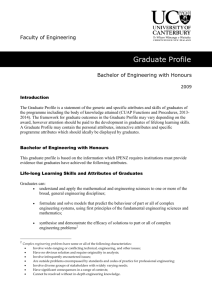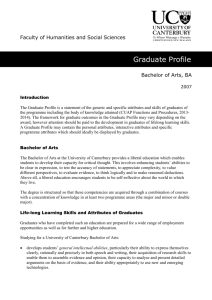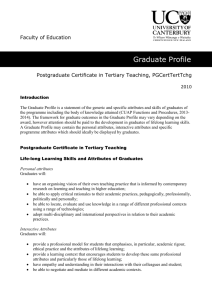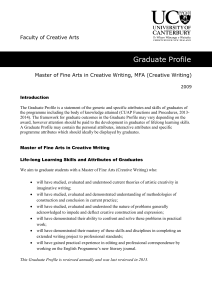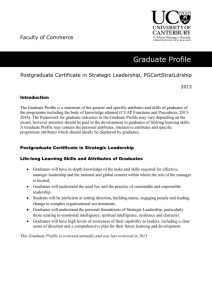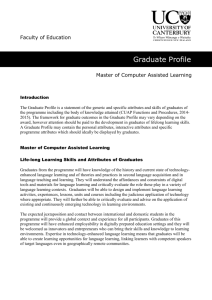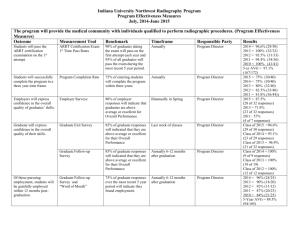the foundation for graduate attributes - REAP [Re
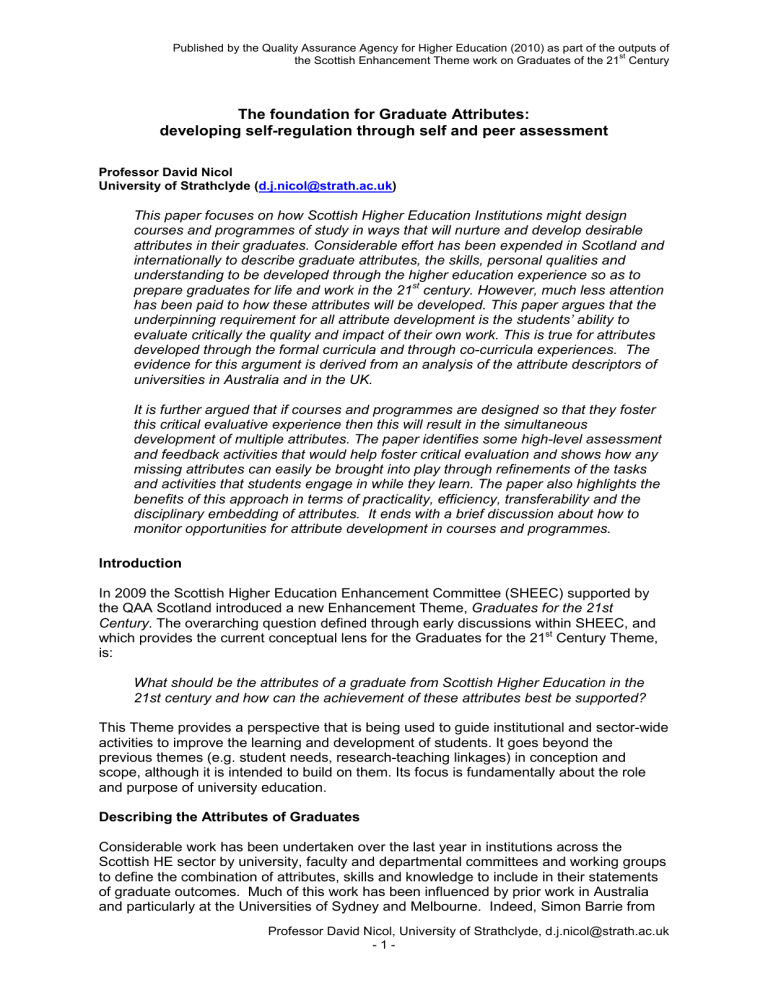
Published by the Quality Assurance Agency for Higher Education (2010) as part of the outputs of the Scottish Enhancement Theme work on Graduates of the 21 st
Century
The foundation for Graduate Attributes: developing self-regulation through self and peer assessment
Professor David Nicol
University of Strathclyde ( d.j.nicol@strath.ac.uk
)
This paper focuses on how Scottish Higher Education Institutions might design courses and programmes of study in ways that will nurture and develop desirable attributes in their graduates. Considerable effort has been expended in Scotland and internationally to describe graduate attributes, the skills, personal qualities and understanding to be developed through the higher education experience so as to prepare graduates for life and work in the 21 st
century. However, much less attention has been paid to how these attributes will be developed. This paper argues that the underpinning requirement for all attribute development is the students’ ability to evaluate critically the quality and impact of their own work. This is true for attributes developed through the formal curricula and through co-curricula experiences. The evidence for this argument is derived from an analysis of the attribute descriptors of universities in Australia and in the UK.
It is further argued that if courses and programmes are designed so that they foster this critical evaluative experience then this will result in the simultaneous development of multiple attributes. The paper identifies some high-level assessment and feedback activities that would help foster critical evaluation and shows how any missing attributes can easily be brought into play through refinements of the tasks and activities that students engage in while they learn. The paper also highlights the benefits of this approach in terms of practicality, efficiency, transferability and the disciplinary embedding of attributes. It ends with a brief discussion about how to monitor opportunities for attribute development in courses and programmes.
Introduction
In 2009 the Scottish Higher Education Enhancement Committee (SHEEC) supported by the QAA Scotland introduced a new Enhancement Theme, Graduates for the 21st
Century. The overarching question defined through early discussions within SHEEC, and which provides the current conceptual lens for the Graduates for the 21 st
Century Theme, is:
What should be the attributes of a graduate from Scottish Higher Education in the
21st century and how can the achievement of these attributes best be supported?
This Theme provides a perspective that is being used to guide institutional and sector-wide activities to improve the learning and development of students. It goes beyond the previous themes (e.g. student needs, research-teaching linkages) in conception and scope, although it is intended to build on them. Its focus is fundamentally about the role and purpose of university education.
Describing the Attributes of Graduates
Considerable work has been undertaken over the last year in institutions across the
Scottish HE sector by university, faculty and departmental committees and working groups to define the combination of attributes, skills and knowledge to include in their statements of graduate outcomes. Much of this work has been influenced by prior work in Australia and particularly at the Universities of Sydney and Melbourne. Indeed, Simon Barrie from
Professor David Nicol, University of Strathclyde, d.j.nicol@strath.ac.uk
- 1 -
Published by the Quality Assurance Agency for Higher Education (2010) as part of the outputs of the Scottish Enhancement Theme work on Graduates of the 21 st
Century
Sydney, who has been influential in Australian work on graduate attributes, was a keynote presenter at the first QAA conference on this theme in 2009 and has been a consultant to
SHEEC on this topic (see, Barrie, 2007: Barrie, Hughes and Smith, 2009)
Appendix 1 provides a list of headline statements of graduate attributes as articulated by a number of Scottish Universities. Also included is the list from the Universities of Sydney and Melbourne, given the influence that has emanated from that part of the world. It is obviously valuable that academics in departments, faculties and at senior level in the institutions spend time discussing and defining the kinds of attributes students should develop through their time in higher education. As the list shows, not surprisingly, there is considerable overlap in the attribute descriptors across HE institutions. However, independently of the specific choice of attributes, an important question that needs to be addressed and that is tackled in this paper is ‘how can the achievement of these attributes best be supported?’
Supporting the development of graduate attributes.
Although Australian HE institutions have led the way in devising descriptors of attributes they have been considerably less explicit in how these attributes are developed in courses and programmes. For example, it is not clear how a module or programme might best be designed to ensure that it will help develop these attributes. What kinds of learning activities would be important? Would one wish to ensure that each course helped develop a specific set of attributes or all the university defined attributes? Should one design the course and then adjust it to include each attribute or should the attributes along with the expected subject knowledge and skills be used to design the course? What would be the most tractable entry points and approach for academics in the faculties?
In summary, the key question, for academic staff, in relation to these attributes is how to translate them into curriculum practices in modules and programmes. Specifically:
1. How will learning activities be designed to develop these attributes?
2. How will the development of these attributes be mapped across modules and degree programmes?
3. How will success in graduate attributes development be recognised, monitored and evaluated.
This paper primarily addresses point 1 and only touches on point 2 and 3, although another paper is being prepared that more fully addresses 2 and 3.
The core process underpinning graduate attribute development
This and the following sections present and analyse the attribute statements of the
University of Melbourne. Appendix 2 analyses those of the University of Sydney. The analysis highlights that there is a shared and core process that is a prerequisite for, and that underlies, all attribute development. An analysis of other Scottish HE institutions attribute descriptors uncovers the same underlying process, although space prohibits the presentation of data institution-by-institution.
The University of Melbourne has produced a set of five attributes that the Melbourne experience should help develop in students. The attributes articulate the institution’s aspiration to be research intensive and to prepare students for lifelong learning in a complex world. Table 1 provides a list of these attributes and the descriptors that elaborate and explain them as defined in the University of Melbourne, Learning and Teaching
Management Plan.
Professor David Nicol, University of Strathclyde, d.j.nicol@strath.ac.uk
- 2 -
Published by the Quality Assurance Agency for Higher Education (2010) as part of the outputs of the Scottish Enhancement Theme work on Graduates of the 21 st
Century
Attributes expected of a Melbourne Graduate
Graduate
Attributes
Academically
excellent
Descriptors
• have a strong sense of intellectual integrity and the ethics of scholarship
• have in-depth knowledge of their specialist disciplines
• reach a high level of achievement in writing, generic research
Knowledge across
disciplines
Leaders in
Communities activities, problem solving and communication
• be critical and creative thinkers, with an aptitude for continued selfdirected learning
• be adept at learning in a range of ways, including through information and communication technologies
• examine critically, synthesise and evaluate knowledge across a range of disciplines
• expand their analytical and cognitive skills through learning experiences in diverse subjects
• have the capacity to participate fully in collaborative learning and to confront unfamiliar problems
• have a set of flexible and transferable skills for different types of employment.
• initiate and implement constructive change in their communities, including professions and workplaces
• have excellent interpersonal and decision-making skills, including
Attuned to cultural diversity awareness of personal strengths and limitations
• mentor future generations of learners
• engage in meaningful public discourse, with a profound awareness of community needs
• value different cultures
• be well-informed citizens able to contribute to their communities wherever they choose to live and work
• have an understanding of the social and cultural diversity in our community
• respect indigenous knowledge, cultures and values
Active global citizens • accept social and civic responsibilities
• be advocates for improving and the sustainability of the environment
• have a broad global understanding with a high regard for human rights, equity and ethics
*** The underlining in this Table is the author’s and was not in the original. The intention is to highlight the core process behind most attribute descriptors (see section 1.3)
Self-regulation or autonomy in learning
Examining Table 1 it is clear that the core process underpinning all the Melbourne attributes is the students’ ability to think for themselves, to be self-reliant and to able to evaluate and make judgements about their own thinking and actions: that is, all the attributes require that, at least to some extent, students are self-regulating or autonomous learners.
These ideas are indeed contained in Table 1 (see underlining). Under the descriptors for the attributes the text actually expresses this core idea in a variety of different ways. Under
‘academically excellent’ it mentions critical and creative thinkers with an aptitude for continued self-directed learning. Under ‘knowledge across disciplines’ it highlights that
Professor David Nicol, University of Strathclyde, d.j.nicol@strath.ac.uk
- 3 -
Published by the Quality Assurance Agency for Higher Education (2010) as part of the outputs of the Scottish Enhancement Theme work on Graduates of the 21 st
Century graduates should be able to evaluate knowledge across a range of disciplines. Under
‘leaders in communities’ it says graduates should be able to initiate change and have an awareness of personal strengths and limitations. Under ‘active global citizens’, graduates are assumed to accept social and civic responsibilities and advocate change. Even where self-regulated learning or responsibility is not mentioned it is clear that this is an underpinning requirement. Being ‘attuned to cultural diversity’ requires that students, not teachers, analyse how their views sit within alternative cultural contexts.
Although not articulated in the Melbourne documentation, it is very important that this unifying element shared by all attributes – the idea of autonomy or self-regulation - is recognised, as it provides a useful way of addressing many attributes simultaneously and as such provides a useful framework for thinking about their development.
Appendix 1 presents and analyses the University of Sydney attributes and provides even more compelling evidence for the arguments above.
Curricular processes that help develop self-regulation
The main characteristic of autonomy or self-regulation in learning is that students take some significant responsibility for setting their own learning goals and for evaluating progress in reaching these goals. Fundamentally, developing learner self-regulation requires that students have regular opportunities to:
1. critically evaluate the quality and impact of their own work during and after its production (e.g. academic texts, problem solutions, designs)
2. critically evaluate the quality and impact of the work of their peers.
In the educational literature these two processes are often referred to as self and peer assessment, although to clarify the argument they have been given more precise definitions here. The relationship between 1 and 2 is important: peer assessment or evaluation might be seen as an enabling condition for the development of 1. In fact, peer assessment and self-assessment should both be implemented for the development of learner self-regulation. As Sadler (in press) has argued, peer assessment provides opportunities for students to gain regular practice in the act of evaluation and, in addition, it can help students develop objectivity in making judgments about their own work. Being able to judge the work of others is also an attribute keenly sought by employers.
From research and practice, a range of assessment-related activities have been identified that help foster the development of learner self-regulation (see, Nicol, 2006: 2009).
Drawing on Kuh’s (2009) terminology, I call these High-Impact Assessment and Feedback
Activities (HIAFAs). These HIAFAs include students:
•
reflecting on and assessing the quality of their own work
•
engaging in peer review of each other’s work
•
determining criteria to apply to their own work
•
identifying their own learning needs and setting their own learning goals
•
engaging in collaborative projects where they give each other feedback
•
creating problems or issues that they go on to address
•
reflecting on and evaluating their own learning to build a portfolio
•
devising their own module (e.g. in collaboration with academic staff)
Drawing on these ideas, curriculum designers should be able to design learning experiences in ways that develop in students the desired graduate attributes.
Importantly, however, some fine-tuning of task parameters and learning activities will be required depending on the subject discipline to strengthen the development of specific
Professor David Nicol, University of Strathclyde, d.j.nicol@strath.ac.uk
- 4 -
Published by the Quality Assurance Agency for Higher Education (2010) as part of the outputs of the Scottish Enhancement Theme work on Graduates of the 21 st
Century attributes. The following section provides two brief examples. These examples are articulated in relation to the Melbourne attributes which were outlined above.
Examples of implementation: Fine-tuning task parameters
The first example applies to a social sciences discipline. In the context of a history course, having students critically appraise the quality of their own and other students’ essays would lay a strong foundation for critical thinking and self-directed learning (academically excellent). It would also provide a fertile ground for developing the ability to ‘evaluate knowledge across a broad range of disciplines’ (knowledgeable across disciplines).
Similarly, engaging in these evaluative processes would help develop in students an awareness of their own personal strengths and limitations’ (leaders in communities). If, however, one wished to enhance cross-disciplinary opportunities then this might be achieved through modifications of the task or through structural changes in the curriculum
(e.g. bringing subjects together). Likewise, if one wished to enhance students’ understanding of cultural diversity one could do this by formulating essay tasks that required students to examine historical interpretations from different cultural perspectives
(attuned to cultural diversity) or by formulating group tasks where the members have an appropriate cultural mix. A global or ethical or human rights perspective (active global citizens) could easily be introduced into a historical context, if it were not already required
(e.g. through a role playing task).
This framework is equally applicable to scientific or engineering disciplines. For example, in mathematics, research shows that critical evaluation is necessary if students are to move from merely solving problems by providing correct answers to being able to judge their own problem-solving processes and products. Reciprocal peer appraisal has also been shown to help students explore and discuss different approaches that might be used to solve complex and ill-defined problems. These evaluative processes clearly have a role to play in helping students become critical and creative thinkers with an aptitude for selfdirected learning and with high levels of problem-solving skills (academically excellent). It would also raise students’ awareness of their personal strengths and limitations in solving mathematical problems (leaders in communities). As in the history example, however, it would be easy to fine-tune the learning activities and task parameters to bring into play further aspects of leadership, inter-disciplinary knowledge, cultural diversity or a global dimension. In particular, this would be achieved by formulating tasks that require students to take leadership roles (e.g. mentoring others) and that expose them to the types of complex, ill-defined, interdisciplinary and real world problems that they would face when they enter the workforce.
Benefits of this approach
What are the benefits of this approach to the development of graduate attributes?
1. It identifies a core focus for curriculum design and provides an efficient solution to the attributes agenda. Instead of trying to design-in each attribute separately, a focus on developing learner self-regulation and learner responsibility would bring into view many attributes.
2. The development of graduate attributes would be directly tied to disciplinary content and methods (i.e. the form and substance of critical evaluation will differ across disciplines) with the development of specific attributes strengthened by finetuning of task parameters and learning activities. This would build on what is already being done to foster attributes in academic departments.
Professor David Nicol, University of Strathclyde, d.j.nicol@strath.ac.uk
- 5 -
Published by the Quality Assurance Agency for Higher Education (2010) as part of the outputs of the Scottish Enhancement Theme work on Graduates of the 21 st
Century
3. It will help address co-curricular activities and support students when they engage with part-time work and internships. In these scenarios, students will invariably have to set learning goals and evaluate their own performance without the help of the teacher.
4. It will give students the skills needed to evidence their own attribute development to prospective employers. Providing educational experiences that develop attributes is not a sufficient condition for their evidencing. Only if students develop the ability to evaluate their own learning, and to communicate their findings to others, will they be able to present themselves convincingly to employers.
5. It will help ensure the transfer of attributes and skills to other contexts and to real life situations beyond the university. Research shows that transfer is not a natural by-product of an educational experience. Rather, it is more likely when students engage in self-monitoring, self-reflection and self-assessment of their learning
(National Research Council, 2000: How people learn).
6. It aligns graduate attributes development with most University policy statements, as well as with Scottish Credit and Qualifications Level (SCQF) Level Descriptors and
Subject Benchmark Statements, which talk about developing autonomy or independence in learning but rarely specify how this will be developed.
Discussion
The basic argument in this paper is that to develop graduate attributes, HE institutions should focus their efforts primarily on developing in students the ability to critically evaluate the quality and impact of their own work, and for that to happen, both self-assessment and peer review must play a more prominent role in the curriculum than has been the case in the past. Developing this ‘core attribute’ is the key purpose of a university education, it is necessary for productive engagement in employment and for the engagement in civic responsibilities beyond university.
Some academics might contend that developing the ‘capacity to critically evaluate the quality or impact of one’s own work’ is already implicit in most university curricula.
However, an analysis of course documentation at one university (see www.principlesinpatterns.ac.uk
) indicates that this core idea is almost never explicitly stated as a ‘learning outcome’ in module descriptors. The argument here is that if it were a stated learning outcome, it is likely that this would significantly change the way that curricula are organised and delivered. For example, there would be a much greater emphasis on self and peer processes, and on putting learners in control as co-contributors to the curriculum.
One concern about the approach suggested in this paper relates to the mapping of graduate attributes across curricula. Mapping is important if institutions are to be confident that opportunities exist for attribute development. Yet some commentators on this paper have maintained that if ‘critical self-evaluation’ is the only focus for the planning of attributes development, some attributes (e.g. intercultural awareness) might easily be bypassed in curriculum planning; and if there is no systematic mapping this will undermine opportunities for the development of some attributes. One approach to this issue being advocated in Australia is to ask academics to map desired attributes to intended learning outcomes in curriculum documentation (e.g. Treleavan and Voola, 2008). However, there are problems with this approach. It is complex, it requires significant academic time and commitment and it does not really link attribute development to the student learning experience.
Professor David Nicol, University of Strathclyde, d.j.nicol@strath.ac.uk
- 6 -
Published by the Quality Assurance Agency for Higher Education (2010) as part of the outputs of the Scottish Enhancement Theme work on Graduates of the 21 st
Century
There are alternatives to the Australian approach such as mapping attributes to learning tasks/activities that students engage in during their study as well as to their modes of engagement (e.g. individual or groups) as suggested above. In that regard, various writers have identified tasks/activities that are effective in terms of graduate attribute development, such as professional work-related activities, inquiry and research focused activities and cooperative and collaborative learning tasks (e.g. Kuh, 2009: Jenkins, 2009). A key benefit to be derived from mapping to learning activities rather than learning outcomes is that attribute development would be related more directly to the student’s actual learning experience. This issue, of how to map attributes to the student learning experience is an important topic, which will be addressed more fully in a companion paper to be completed later this year by the author.
Endpoint
Figure 1 is presented as one way of summarising the basic argument in this paper
Figure 1: Graduates for the 21 st
Century: Triggering multiple attribute development through focusing on the core process. [Note that fine-tuning for specific attributes is achieved through a focus on task parameters (e.g. content and learning methods) and modes of learning (e.g. individual or group).
References
Barrie, S.C (2007) A conceptual framework for the teaching and learning of graduate attributes, Studies in Higher Education, 23(3), 313-328
Professor David Nicol, University of Strathclyde, d.j.nicol@strath.ac.uk
- 7 -
Published by the Quality Assurance Agency for Higher Education (2010) as part of the outputs of the Scottish Enhancement Theme work on Graduates of the 21 st
Century
Barrie, S., Hughes, C. & Smith, C. (2009). The national graduate attributes project:
integration and assessment of graduate attributes in curriculum. Strawberry Hill, N. S. W.:
Australian Learning and Teaching Council.
Jenkins, A (2009), Research-Teaching Linkages: enhancing graduate attributes. Published by the Quality Assurance Agency for Higher Education. Available from: http://www.enhancementthemes.ac.uk/documents/ResearchTeaching/QAA292Overview26
0509.pdf
Kuh, G. (2009) High-impact educational practices: what are they, who has access to them, and why do they matter. Washington, DC: Association of American Colleges and
Universities.
National Research Council (2000), How people learn: Brain Mind, Experience and School,
Expanded edition. Committee on Developments in the Science of Learning. J.D
Bransford, A.L. Brown, and R.R Cocking (Eds). Commission on Behavioral and Social
Science Education. Washington, DC: National Academy Press.
Nicol, D.J. & Macfarlane-Dick, D. (2006). Formative assessment and self-regulated learning: A model and seven principles of good feedback practice. Studies in Higher
Education, 31(2), 199-218
Nicol, D. (2009) Transforming assessment and feedback: enhancing integration and empowerment in the first year. Published by the Quality Assurance Agency (QAA) for
Higher Education. Available from http://www.enhancementthemes.ac.uk/documents/firstyear/First_Year_Transforming_Asse ss.pdf
Sadler, (in press), Beyond feedback:: Developing student capability in complex appraisal,
Assessment and Evaluation in Higher Education.
Treleaven, L and Voola, R. (2008), Integrating the development of graduate attributes through constructive alignment, Journal of Marketing Education, 30(2), 160-173.
Further Information
This paper has been produced as part of the outputs of the Scottish Quality Assurance
Agency’s (QAA) Enhancement Theme work on ‘Graduates of the 21 st
Century’. This paper and other outputs relating to that Theme can be found at: http://www.enhancementthemes.ac.uk/themes/21stCGraduates/outcomes.asp
How to refer to this paper
Nicol, D (2010), The foundation for Graduate Attributes: developing self-regulation through self and peer assessment, Published by the Quality Assurance Agency for Higher
Education, available from http://www.enhancementthemes.ac.uk/themes/21stCGraduates/outcomes.asp
and from www.reap.ac.uk/resources
Professor David Nicol, University of Strathclyde, d.j.nicol@strath.ac.uk
- 8 -
Published by the Quality Assurance Agency for Higher Education (2010) as part of the outputs of the Scottish Enhancement Theme work on Graduates of the 21 st
Century
APPENDIX 1
GRADUATE ATTRIBUTES: HEADLINE STATEMENTS FROM 6 UNIVERSITIES
Graduate Attributes as formulated across a range of Universities
University A: Scotland
•
Academically excellent
•
Critical thinkers and effective communicators
•
Open to learning and personal development
•
Active citizens
University B: Scotland
•
Have academic, professional and personal skills
•
Undertake and use research
•
Conduct themselves professionally and ethically
•
Have the capacity to help build a socially just and sustainable society
•
Are mindful of their role as global citizens
•
Demonstrate high level skills of information literacy and communication
•
Promote the principles of multi-/inter-disciplinarity;
•
Are confident, responsible, autonomous and critically reflective lifelong learners.
University C: Scotland
•
Enagaged: contributing academically and socially
•
Enterprising: creating opportunities
•
Ethical: identifying risks and taking responsibility
•
Enquiring: pursuing critical questions
University D: Scotland
•
Confident thinkers
•
Determined creators
•
Flexible collaborators
•
Challenging complexity and driving change
University of Melbourne
•
Academically excellent
•
Knowledgeable across disciplines
•
Leaders in communities
•
Attuned to cultural diversity
•
Active global citizens
University of Sydney
Overarching attributes
•
Scholarship
•
Global citizenship
•
Lifelong learning
As combination of 5 overlapping clusters of skills and abilities
•
Research and inquiry
•
Information literacy
•
Personal and intellectual autonomy
•
Ethical, social and professional understanding
•
Communication
Professor David Nicol, University of Strathclyde, d.j.nicol@strath.ac.uk
- 9 -
Published by the Quality Assurance Agency for Higher Education (2010) as part of the outputs of the Scottish Enhancement Theme work on Graduates of the 21 st
Century
APPENDIX 2
Further evidence for the argument
In order to establish the validity of the proposition that there is a core process underpinning all attributes (i.e. the students’ ability to evaluate critically the quality of their own work), the attribute descriptions of other universities were analysed, including the University of
Sydney. Sydney was selected because it has a much longer experience in this area and because Simon Barrie has influenced thinking in Scotland. This section only reports on
Sydney although the evidence is similar for the University of Strathclyde, and indeed for the range of other Scottish Universities listed in Appendix 1. Below is a list of the Sydney graduate attributes with their relevant descriptors, identified in the Sydney documentation as ‘clusters of abilities’.
List of University of Sydney Graduate Attributes
Graduate Attributes
Research and Inquiry: graduates will be able to create new knowledge and understanding through the process of research and inquiry.
Information Literacy: graduates will be able to use information effectively in a range of contexts
Personal and Intellectual
Autonomy: graduates will be able to work independently and sustainably, in a way that is informed by openness, curiosity and a desire to meet new challenges.
Ethical, Social and
Professional
Understanding: graduates hold personal values and beliefs consistent with their roles as responsible members of local, national, international and
Cluster of Abilities
•
Be able to identify, define and analyse problems and create processes to solve them
•
Be able to exercise critical judgment and critical thinking in creating new understanding.
•
Be creative and imaginative thinkers
•
Have an informed respect for the principles, methods, standards, values and boundaries of their discipline and the capacity to question these
•
Be able to critically evaluate existing understandings and recognise the limitations of their own knowledge
•
Recognise the extent of information needed
•
Locate needed information efficiently and effectively
•
Evaluate information and its sources
•
Use information in critical thinking and problem solving contexts to construct knowledge
•
Understand economic, legal, social and cultural issues in the use of information
•
Use contemporary media and technology to access and manage information
•
Be intellectually curious and able to sustain intellectual interest
•
Be capable of rigorous and independent thinking
•
Be open to new ideas, methods and ways of thinking
•
Be able to respond effectively to unfamiliar problems in unfamiliar contexts
•
Be able to identify processes and strategies to learn and meet new challenges
•
Be independent learners who take responsibility for their own learning, and are committed to continuous reflection, selfevaluation and self-improvement
•
Have a personal vision and goals and be able to work towards these in a sustainable way
•
Strive for truth, honesty, integrity, open-mindedness, fairness and generosity
•
Acknowledge their personal responsibility for their own value judgments and behaviour
•
Understand and accept social, cultural, global and environmental responsibilities
•
Be committed to social justice and principles of sustainability
•
Have an appreciation of and respect for diversity
•
Hold a perspective that acknowledges local, national and international concerns
Professor David Nicol, University of Strathclyde, d.j.nicol@strath.ac.uk
- 10 -
Published by the Quality Assurance Agency for Higher Education (2010) as part of the outputs of the Scottish Enhancement Theme work on Graduates of the 21 st
Century professional communities
Communication: graduates will use and value communication as a tool for negotiating and creating new understanding, interacting with others, and furthering their own learning
•
Work with, manage, and lead others in ways that value their diversity and equality and that facilitate their contribution to the organisation and the wider community
•
Use oral, written, and visual communication to further their own learning
•
Make effective use of oral, written and visual means to critique, negotiate, create and communicate understanding
•
Use communication as a tool for interacting and relating to others
*** The underlining emphasis is the author’s and was not in the original.
What is notable about the analysis presented in Table 2 is that it provides even stronger evidence than that provided by the Melbourne indicators for the argument that selfregulation, self-responsibility and, importantly, the ability to critically evaluate underpins all attribute development. Instead of three out of five (Melbourne), at least four out of five
Sydney attributes are explicitly underpinned by critical evaluation or self-responsibility.
Only ‘communication’ is weakly defined in this way.
Professor David Nicol, University of Strathclyde, d.j.nicol@strath.ac.uk
- 11 -
